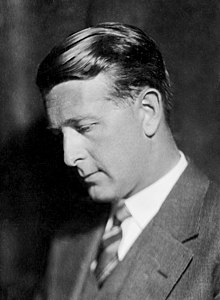Bertil Ohlin | |
|---|---|
 | |
| Minister of Commerce and Industry | |
| In office 1944–1945 | |
| Prime Minister | Per Albin Hansson |
| Preceded by | Herman Eriksson |
| Succeeded by | Gunnar Myrdal |
| Leader of the People's Party | |
| In office 1944–1967 | |
| Preceded by | Gustaf Andersson |
| Succeeded by | Sven Wedén |
| Member of the Swedish Parliament for Stockholm Municipality | |
| In office 1938–1970 | |
| President of the Nordic Council | |
| In office 1959–1959 | |
| Preceded by | Nils Hønsvald |
| Succeeded by | Gísli Jónsson |
| In office 1964–1964 | |
| Preceded by | Nils Hønsvald |
| Succeeded by | Sigurður Bjarnason |
| Personal details | |
| Born | Bertil Gotthard Ohlin 23 April 1899 Klippan, Sweden |
| Died | 3 August 1979 (aged 80) Åre, Sweden |
| Political party | People's Party |
| Alma mater | Lund University (BA) Stockholm School of Economics (MSc) Harvard University (MA) Stockholm University (PhD) |
| Known for | Heckscher–Ohlin model Heckscher–Ohlin theorem |
| Awards | Nobel Memorial Prize in Economic Sciences (1977) |
| Scientific career | |
| Fields | Economics |
| Institutions | University of Copenhagen (1925–1930) Stockholm School of Economics (1930–1965) |
| Doctoral advisor | Gustav Cassel |
Bertil Gotthard Ohlin (Swedish: [ˈbæ̌ʈːɪl ʊˈliːn]) (23 April 1899 – 3 August 1979) was a Swedish economist and politician. He was a professor of economics at the Stockholm School of Economics from 1929 to 1965. He was also leader of the People's Party, a social-liberal party which at the time was the largest party in opposition to the governing Social Democratic Party, from 1944 to 1967. He served briefly as Minister of Commerce and Industry from 1944 to 1945 in the Swedish coalition government during World War II. He was President of the Nordic Council in 1959 and 1964.
Ohlin's name lives on in one of the standard mathematical models of international free trade, the Heckscher–Ohlin model, which he developed together with Eli Heckscher. He was jointly awarded the Nobel Memorial Prize in Economic Sciences in 1977 together with the British economist James Meade "for their pathbreaking contribution to the theory of international trade and international capital movements".